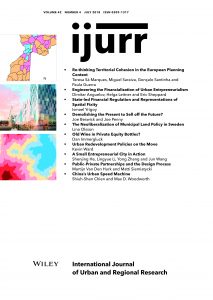This article describes the reemergence, in the wake of the mortgage crisis, of a predatory financial practice in predominantly black neighborhoods in the US: the contract for deed (CFD). The CFD has a notorious urban history; it was a focus of social justice organizing in 1960s Chicago, which helped lay the groundwork for advocacy that culminated in two important laws in the US: the Home Mortgage Disclosure Act of 1975 and the Community Reinvestment Act of 1977. This article places the reemergence of the CFD in the post-crisis cycle of housing investment and disinvestment, estimates the minimum scale of CFD ownership, and examines the geography of a well-known CFD seller in the Atlanta area. As policymakers in the US took efforts to restrict predatory lending fueled by private-label securitization following the subprime crisis, capital markets shifted toward private equity financiers who provided a new supply of lightly regulated capital for urban housing markets. Predominantly black neighborhoods became prey for high-return schemes meant to extract as much cash flow out of vulnerable residents as possible, offering them the illusion of homeownership. The findings show that the CFD seller focused on black neighborhoods and suggests that its profits from this activity have been quite lucrative.

